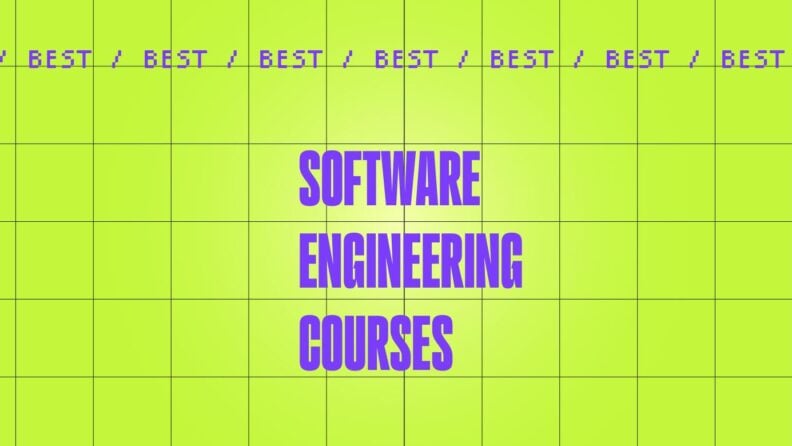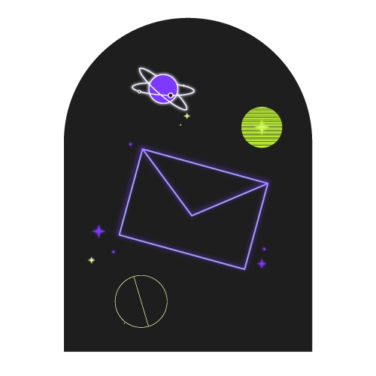Software engineering today isn’t just about writing code—it’s about solving increasingly complex challenges in a landscape dominated by microservices, cloud-native architectures, and ever-changing DevOps practices.
Many technical leaders and engineers find themselves asking: How do I sharpen my team’s edge while navigating rapid shifts in technology? This article offers a curated list of the best software engineering courses tailored to tackle real-world issues, like implementing scalable microservices, improving code efficiency, and integrating AI into workflows.
With options that address pressing challenges like debugging distributed systems or adopting secure development practices, these programs will help you lead your team confidently into the next era of software development.
Best Software Engineering Courses Shortlist
Here's a shortlist of the best software engineering courses I think are worth your time in 2025:
- Online Bachelor of Science in Software Engineering (ASU)
- Introduction to Software Engineering (IBM)
- Software Engineering Fundamentals (Griffith University)
- Software Development Lifecycle Specialization (University of Minnesota)
- Coding Bootcamp for Software Engineering (Flatiron School)
- Software Engineering Principles in Python (DataCamp)
- Java Programming and Software Engineering Fundamentals Specialization (Duke University)
- Software Engineering Bootcamp (Springboard)
- IBM: Software Engineering Basics for Everyone (IBM)
- Software Engineering: Modeling Software Systems using UML (HKUST)
- Full-Time Software Engineering Immersive (Fullstack Academy)
- Software Engineering for Data Scientists (Codecademy)
- Software Development Processes and Methodologies (University of Minnesota)
- Bachelor’s Degree in Software Engineering (GCU)
- Computer Science 307: Software Engineering (Study.com)
- Backend Engineer (Codecademy)
- Online Software Engineering Degree (WGU)
- Software Engineering Bootcamp (General Assembly)
- Algorithms and Software Engineering for Professionals (Udemy)
- IBM DevOps and Software Engineering Professional Certificate (IBM)
Find out each detail of the course below.
Overview of the Best Software Engineering Courses
1. Online Bachelor of Science in Software Engineering (Arizona State University)
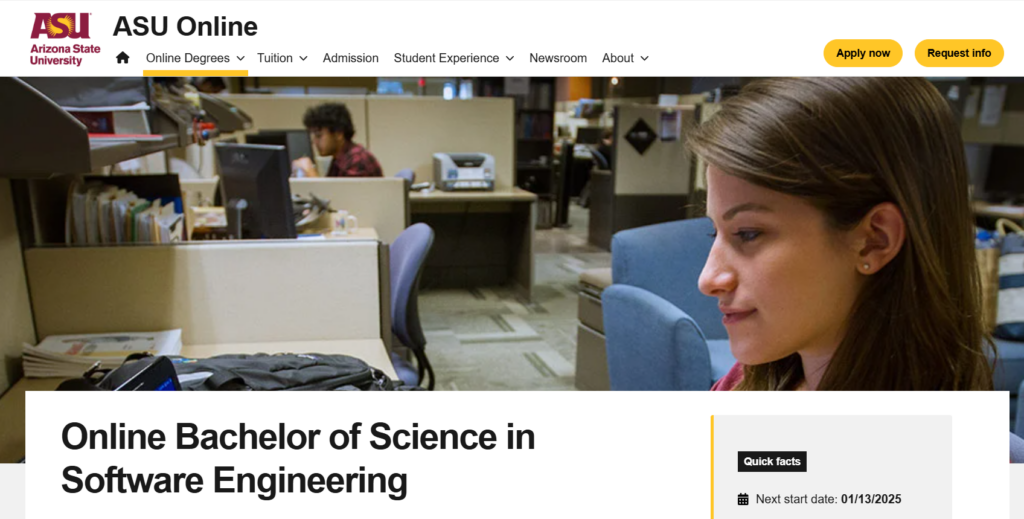
This course provides a project-driven curriculum in software engineering, preparing students for professional roles in application development, systems management, and software deployment. The program is structured to build hands-on expertise across computer systems, coding, and modeling through real-world software engineering projects.
- Who It’s For: Aspiring software engineers seeking a comprehensive education, aspiring computer programmers, IT managers, software developers, and computer science officers
- Topics Covered:
- Programming fundamentals
- Database management
- Operating system management
- Calculus and engineering physics
- Machine learning and cybersecurity basics
- Health care systems applications
- Online, In-Person, or Both? Online
- Exam Required? No
- How Many Hours Of Instruction: 120 credit hours
- Eligibility Requirements:
- General Requirements: Meet ASU’s standard admission criteria.
- First-Year Students: SAT 1210 or ACT 24, 3.0 GPA or top 25% class rank, up to one deficiency allowed (not in math/lab science).
- Transfer Students:
- <24 credits: GPA 2.75, meet first-year criteria.
- 24+ credits: GPA 2.75, up to one deficiency allowed if high school transcripts are required.
- International: Meet engineering standards, possible English proficiency (TOEFL 79 iBT or IELTS 6.5).
- Price:
- Resident tuition: Fall 2024: $4234 and Spring 2025: $4233
- Non-resident tuition: Fall 2024: $8451 and Spring 2025: $8450
- Take The Course: ASU Online
2. Introduction to Software Engineering (IBM)
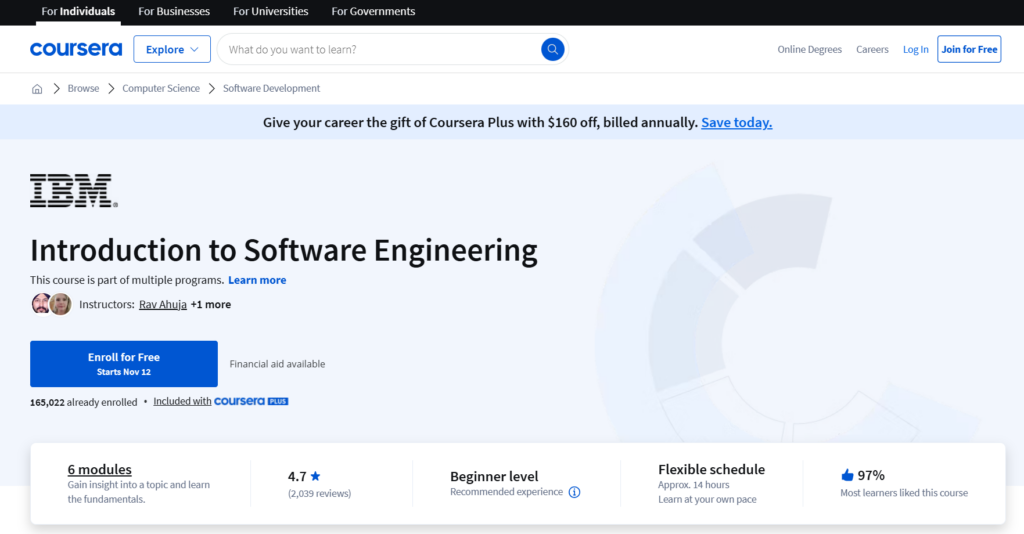
This course introduces foundational concepts in software engineering, including essential development frameworks and practical labs for hands-on experience. It provides a flexible structure, allowing learners to explore programming languages and development methodologies at their own pace.
- Who It’s For: Beginners exploring career paths in software engineering
- Topics Covered:
- Software development lifecycle
- Agile and Scrum methodologies
- Technologies and stacks
- Introduction to software engineering
- Basics of programming
- Software architecture, design, and patterns
- Software engineering skillsets
- Online, In-Person, or Both? Online
- Exam Required? No
- Duration: 14 hours
- How Many Hours Of Instruction: Self-paced
- Eligibility Requirements: None
- Price: Free (with optional paid certificate)
- Take The Course: Coursera
3. Software Engineering Fundamentals (Griffith University)
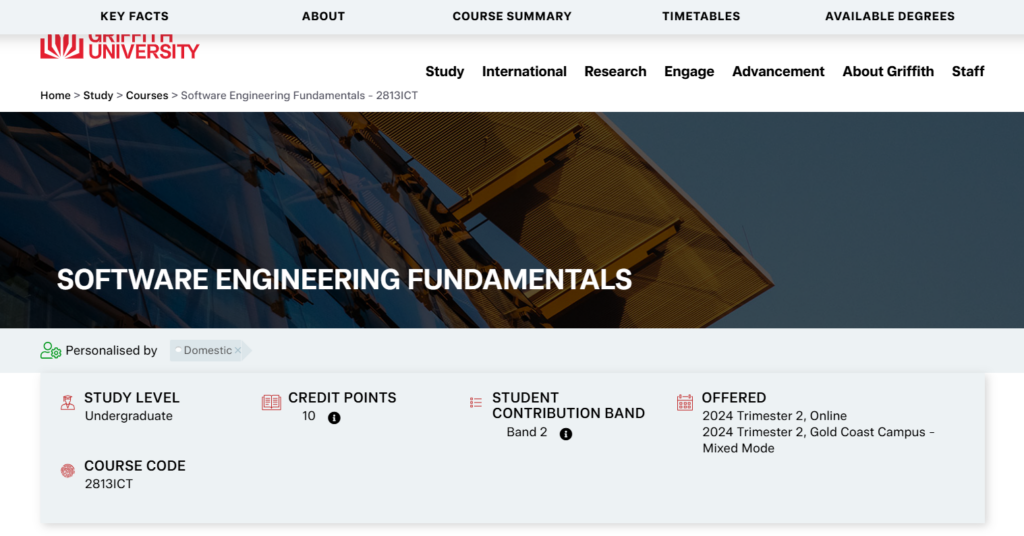
This course provides a foundation in software engineering, covering the lifecycle phases of software systems from requirements analysis to deployment. Students gain essential skills in modeling, requirements engineering, and testing within an introductory software engineering program.
- Who It’s For: Students beginning their journey in software engineering
- Topics Covered:
- Software lifecycle phases
- Requirements analysis and specification
- Software design and construction
- Testing and validation methods
- Basic project management
- Online, In-Person, or Both? Both
- Exam Required? No
- Duration: 12 weeks
- How Many Hours Of Instruction: 1 hour and 50 minutes per week
- Eligibility Requirements: None
- Price: Contact Griffith University for tuition details
- Take The Course: Griffith University
4. Software Development Lifecycle Specialization (University of Minnesota)
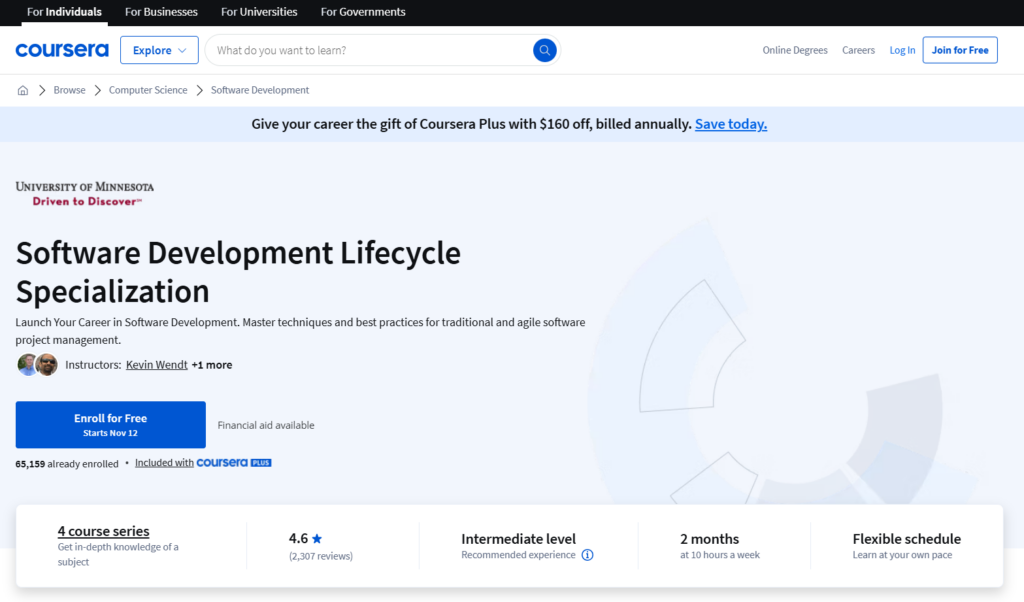
This course offers an in-depth exploration of the Software Development Lifecycle, focusing on various methodologies, including agile, lean, and waterfall. It provides practical case studies for learners to apply SDLC concepts, fostering project management and process improvement skills.
- Who It’s For: Professionals and students seeking to specialize in software development processes
- Topics Covered:
- Agile methodology and story mapping
- Lean development and value stream mapping
- Traditional (waterfall) SDLC practices
- Secure software development practices
- SDLC methodology analysis and improvement
- Online, In-Person, or Both? Online
- Exam Required? No
- Duration: 2 months
- How Many Hours Of Instruction: 10 hours per week (self-paced)
- Eligibility Requirements: None
- Price: Enroll for Free (with optional paid certificate)
- Take The Course: Coursera
5. Coding Bootcamp for Software Engineering (Flatiron School)

This course provides an intensive, project-based coding education covering front-end and back-end development and emerging artificial intelligence (AI) tools. It prepares students for industry roles through hands-on learning with personalized instructor support and collaborative projects.
- Who It’s For: Individuals looking for immersive, fast-track training in coding
- Topics Covered:
- Front-end development
- Back-end development
- Data structures
- Algorithms
- Front-End Web Applications
- Back-End Web APIs
- Online, In-Person, or Both? Both
- Exam Required? No
- Duration:
- Full-time: 15 weeks
- Part-time: 40 weeks
- How Many Hours Of Instruction: Self-paced
- Eligibility Requirements:
- Complete Software Engineering Prep: A mandatory prep course lasting 60-80 hours.
- Basic Credential Requirements: Proficiency in HTML, CSS, and JavaScript.
- Canvas Platform Familiarity: Setup and navigate the learning environment.
- Computing Environment Setup: Ensure all tools are configured for coursework on day one.
- Price: $17,900
- Take The Course: Flatiron School
6. Software Engineering Principles in Python (DataCamp)
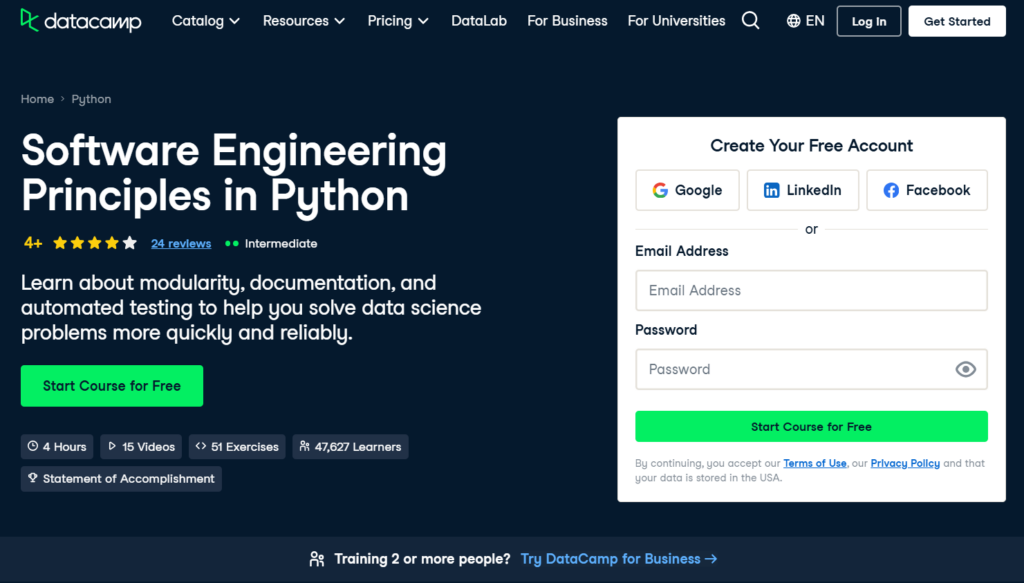
This course focuses on software engineering principles in Python, teaching modularity, documentation, and automated testing for efficient data science workflows. It guides learners in building maintainable code, culminating in creating a custom Python package.
- Who It’s For: Python programmers interested in software engineering concepts
- Topics Covered:
- Modularity in Python code
- Writing and structuring Python modules
- Object-oriented programming and classes
- Documentation best practices
- Automated testing and maintainability
- Online, In-Person, or Both? Online
- Exam Required? No
- Duration: 4 hours
- How Many Hours Of Instruction: Self-paced
- Eligibility Requirements:
- Prerequisites: Introduction to Functions in Python
- Price: Free
- Take The Course: DataCamp
7. Java Programming and Software Engineering Fundamentals Specialization (Duke University)
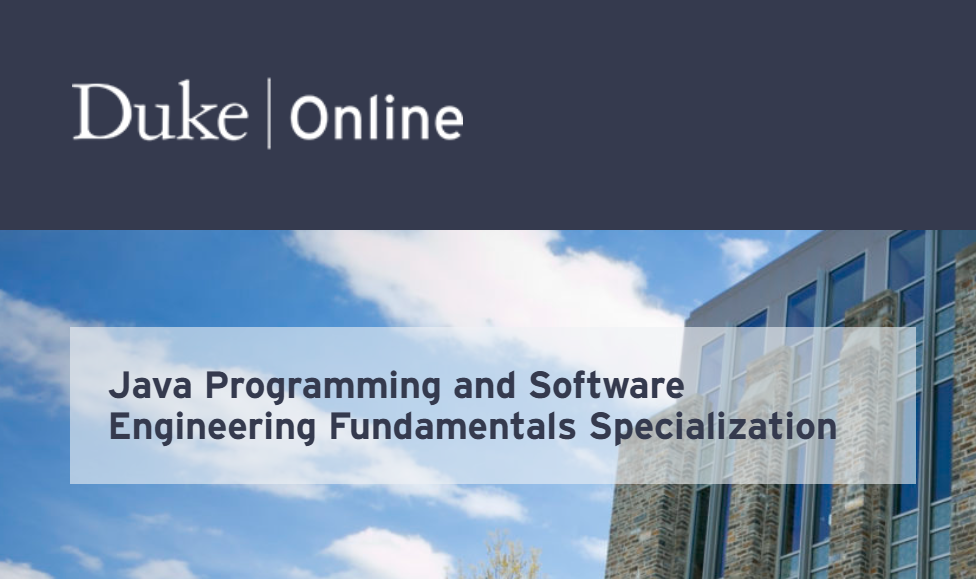
This course offers a comprehensive introduction to Java programming and software engineering, focusing on developing essential programming and problem-solving skills. It enables students to build portfolios, culminating in a capstone project to create a recommender engine.
- Who It’s For: Beginner programmers interested in Java and software engineering
- Topics Covered:
- Java programming and in-demand programming languages
- Algorithm design and debugging
- Operating system fundamentals
- Data analysis with CSV files
- Capstone project: recommender engine
- Building interactive web applications
- Online, In-Person, or Both? Online
- Exam Required? No
- Duration: 4 hours
- How Many Hours Of Instruction: Self-paced
- Eligibility Requirements: None
- Take The Course: Duke University
8. Software Engineering Bootcamp (Springboard)
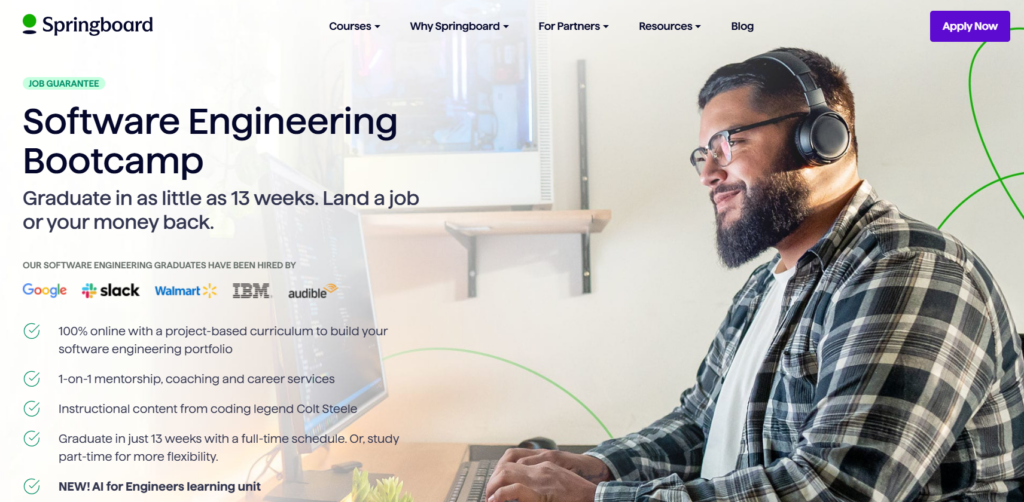
This online course provides a project-based, full-stack software engineering education, featuring mentorship and career support to prepare students for the job market. It offers hands-on experience with popular tools, assessments, and an AI learning unit to enhance coding efficiency.
- Who It’s For: Career switchers or beginners looking for comprehensive software engineering training
- Topics Covered:
- Full-stack development (MERN stack)
- JavaScript and APIs
- Web application principles and development tools
- AI for coders
- Portfolio and career projects
- Online, In-Person, or Both? Online
- Exam Required? No
- Duration:
- Full-time: 13 weeks
- Part-time: 36 weeks
- How Many Hours Of Instruction:
- Full-time: 40 hours per week
- Partime: 11 to 17 hours per week (self-paced)
- Eligibility Requirements:
- JavaScript Fundamentals: Ability to write basic functions, loops, conditional statements, and declare variables
- Problem-Solving Skills: Capability to logically break down problems and devise solutions
- Recommended Knowledge: Familiarity with HTML and CSS basics for creating simple web pages
- Price: $13,860
- Take The Course: Springboard
9. IBM: Software Engineering Basics for Everyone (IBM)
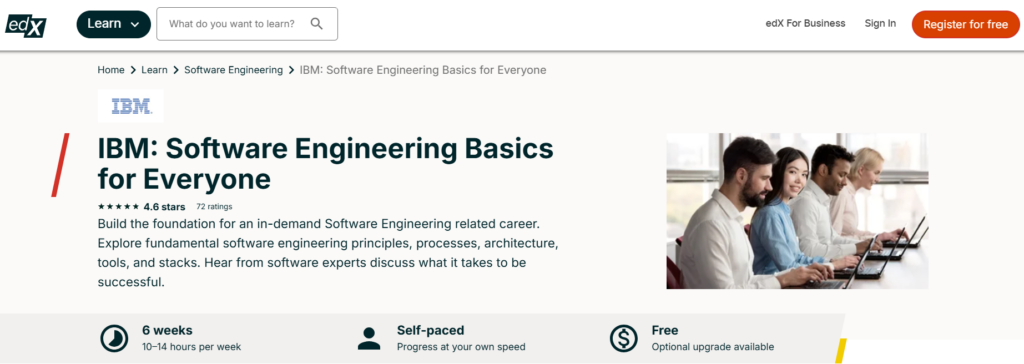
This course introduces foundational software engineering concepts, covering essential principles like the Software Development Lifecycle (SDLC), development methodologies, and basic programming. Through expert insights and hands-on projects, learners gain familiarity with tools, technologies, and key industry practices.
- Who It’s For: Individuals with no prior experience in software engineering
- Topics Covered:
- Software lifecycle
- Software versions
- Basic coding
- Introduction to software development
- Phases in the SDLC
- Building quality software
- Software testing
- Software documentation
- Online, In-Person, or Both? Online
- Exam Required? No
- Duration: 6 weeks
- How Many Hours Of Instruction: 10 to 14 hours per week (self-paced)
- Eligibility Requirements: Basic computer literacy
- Price: Free (with optional upgrade available)
- Take The Course: edX
10. Software Engineering: Modeling Software Systems using UML (Hong Kong University of Science and Technology)
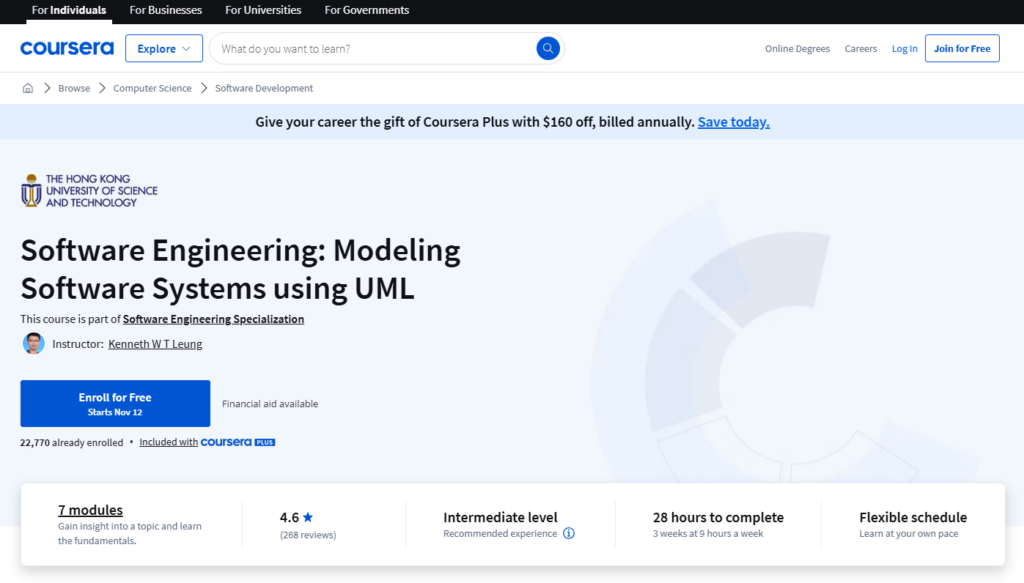
This course explores modeling software systems using Unified Modeling Language (UML) to capture system requirements and support clear communication among stakeholders. It emphasizes the requirement analysis phase of the Software Development Life Cycle (SDLC), guiding learners to create domain and use-case models.
- Who It’s For: Software engineers and developers interested in UML
- Topics Covered:
- UML fundamentals and modeling techniques
- Requirement analysis in SDLC
- Domain modeling for data requirements
- Use-case modeling for functional requirements
- Online, In-Person, or Both? Online
- Exam Required? Yes
- Duration: 28 hours
- How Many Hours Of Instruction: 5 hours per week (self-paced)
- Eligibility Requirements: None
- Price: Enroll for free (with optional paid certificate)
- Take The Course: Coursera
11. Full-Time Software Engineering Immersive (Fullstack Academy)
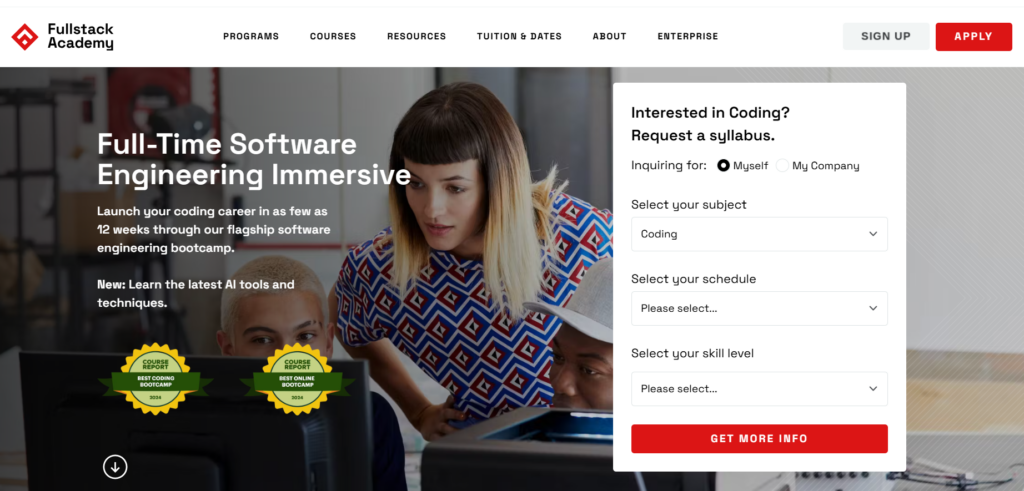
This course is an immersive program in software engineering, focusing on in-demand skills like JavaScript and real-world coding tools. It includes hands-on learning with access to generative AI tools, dedicated career coaching, and instruction from industry-experienced professionals.
- Who It’s For: Individuals seeking an in-depth, full-time training program in software engineering, those passionate about tech, career changers, and interested in upskilling
- Topics Covered:
- JavaScript-based full-stack development
- Generative AI tools (ChatGPT, Bing AI)
- Real-world coding tools (Git, GitHub, VS Code)
- Collaborative coding practices
- Career readiness and interpersonal skills
- Online, In-Person, or Both? Online
- Exam Required? No
- Duration: 12 weeks
- How Many Hours Of Instruction: 7 hours per day
- Eligibility Requirements: None
- Price: $12,995
- Take The Course: Fullstack Academy
12. Software Engineering for Data Scientists (Codecademy)
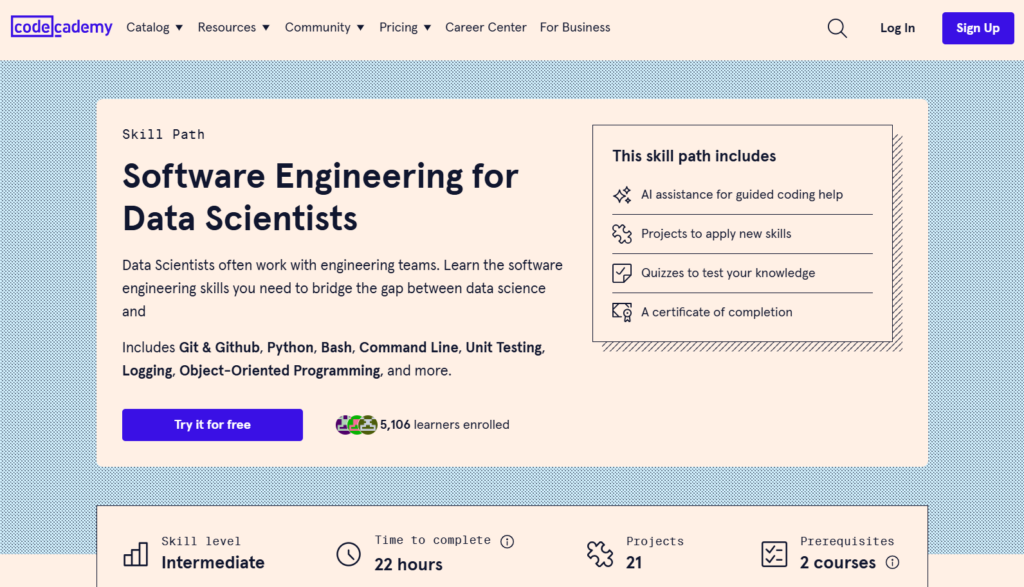
This course teaches essential software engineering skills tailored for data scientists, covering object-oriented programming, version control, and command-line operations. It includes hands-on projects and tools to enhance productivity, bridging the gap between data science and engineering..
- Who It’s For: Data scientists looking to improve their software engineering skills
- Topics Covered:
- Introduction to version control
- Unit testing
- Code review
- Software design
- Software Engineering in Python
- Command line
- Writing bash scripts
- Git for deployment
- Online, In-Person, or Both? Online
- Exam Required? No
- Duration: 22 hours
- How Many Hours Of Instruction: Self-paced
- Eligibility Requirements:
- Prerequisites:
- Getting Started with Python for Data Science
- Python for Data Science: Working with Data
- Prerequisites:
- Price: Free
- Take The Course: Codecademy
13. Software Development Processes and Methodologies (University of Minnesota)
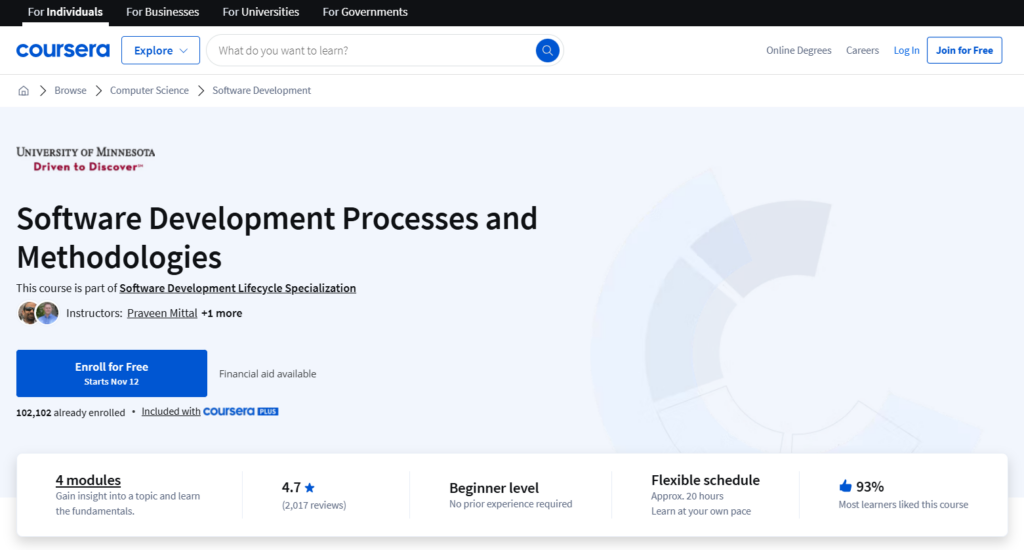
This course provides an overview of software development processes and methodologies, examining traditional and agile models like Waterfall, V-model, and Spiral. It guides learners in understanding the strengths and weaknesses of each methodology to apply best practices conceptually.
- Who It’s For: Project managers and software developers
- Topics Covered:
- Agile methodologies
- Waterfall model
- Core software engineering practices
- Traditional models
- Standard methodologies
- Propose a suitable methodology
- Online, In-Person, or Both? Online
- Exam Required? No
- Duration: 20 hours
- How Many Hours Of Instruction: Self-paced
- Eligibility Requirements: None
- Price: Enroll for free (with optional paid certificate)
- Take The Course: Coursera
14. Bachelor’s Degree in Software Engineering (Grand Canon University)
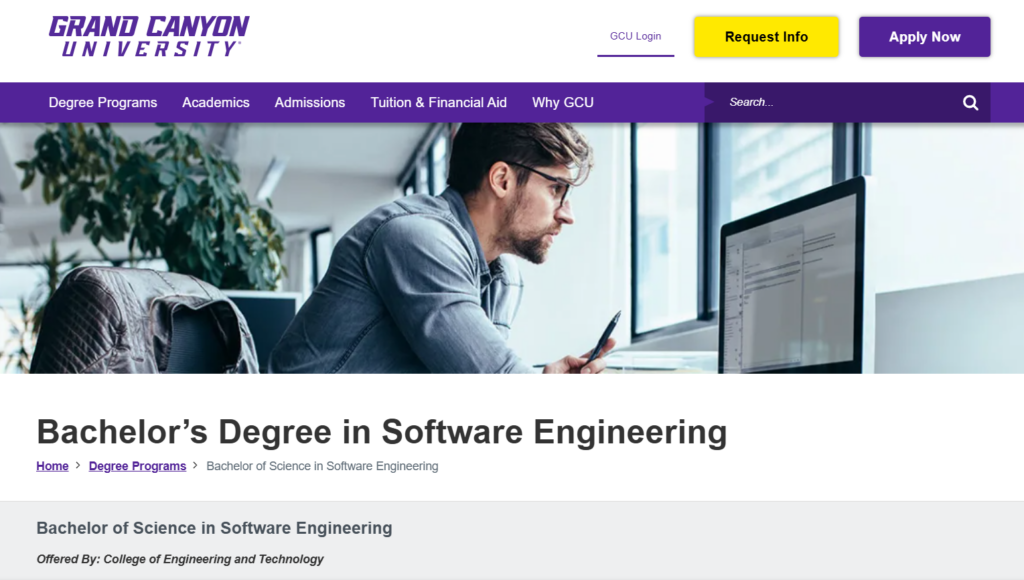
This degree program provides a comprehensive education in software engineering, emphasizing programming, system design, and project management. It prepares students with hands-on experience developing and implementing software solutions across various applications.
- Who It’s For: Individuals seeking a traditional undergraduate degree in software engineering, aspiring software engineers, project managers, and entrepreneurs
- Topics Covered:
- Computer programming
- Software architecture
- Database architect
- Engineering software solutions for complex problems
- Software Development Life Cycle
- Differentiating software development processes
- Estimation techniques and measurement
- Exercising strong communication skills
- Online, In-Person, or Both? Both
- Exam Required? No
- Duration: 15 weeks
- Eligibility Requirements: High school diploma or equivalent
- Price: $8,250 per semester
- Take The Course: Grand Canyon University
15. Computer Science 307: Software Engineering (Study.com)
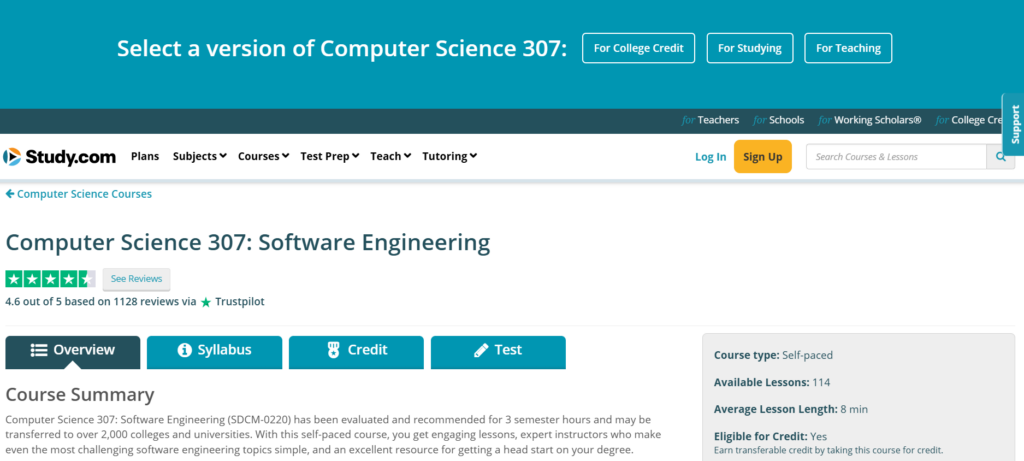
This course provides an in-depth introduction to software engineering, focusing on core concepts in software design, development, and maintenance. It includes video lessons and quizzes to reinforce understanding and prepare learners for practical applications in the field.
- Who It’s For: Students and professionals seeking an understanding of software engineering principles
- Topics Covered:
- Software development life cycle
- Requirements analysis
- Design and architecture principles
- Software testing and maintenance
- Project management fundamentals
- Online, In-Person, or Both? Online
- Exam Required? None
- Duration: 8 minutes per lesson
- How Many Hours Of Instruction: Self-paced
- Eligibility Requirements: None
- Take The Course: Study.com
16. Backend Engineer (Codecademy)
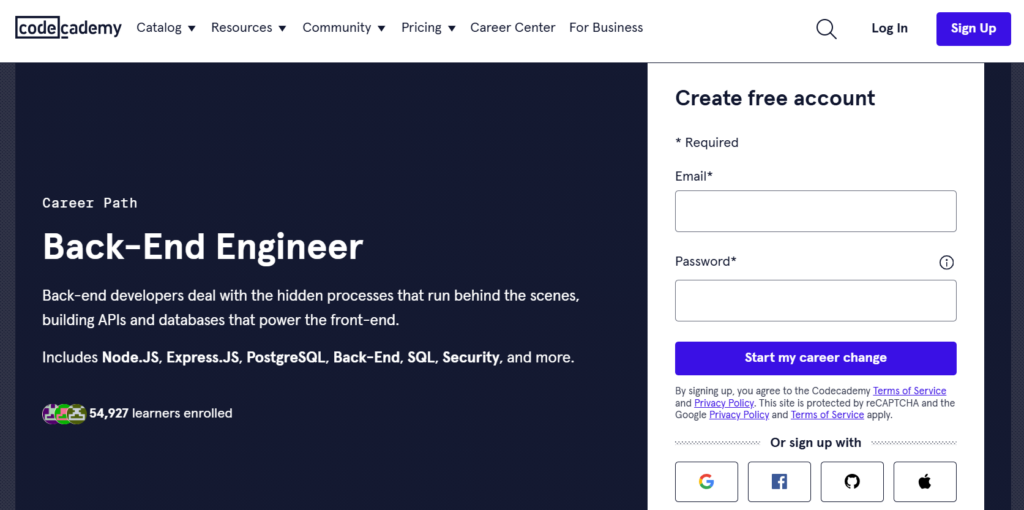
This course prepares students to develop and maintain server-side applications that support front-end functionality. It emphasizes essential skills for creating secure and efficient back-end systems. Students are equipped for real-world back-end development through hands-on experience with technologies like Node.js, SQL, and security practices.
- Who It’s For: Aspiring backend developers
- Topics Covered:
- Building APIs and databases
- Setting Up a Dev Environment
- Web Dev Fundamentals
- Use of JavaScript Syntax
- Building interactive websites with JavaScript
- Integrate Postre.SQL
- Building Back-End with Express.JS
- Git and GitHub
- Online, In-Person, or Both? Online
- Exam Required? No
- Duration: 105 hours
- How Many Hours Of Instruction: Self-paced
- Eligibility Requirements: None
- Take The Course: Codecademy
17. Online Software Engineering Degree (Western Governors University)
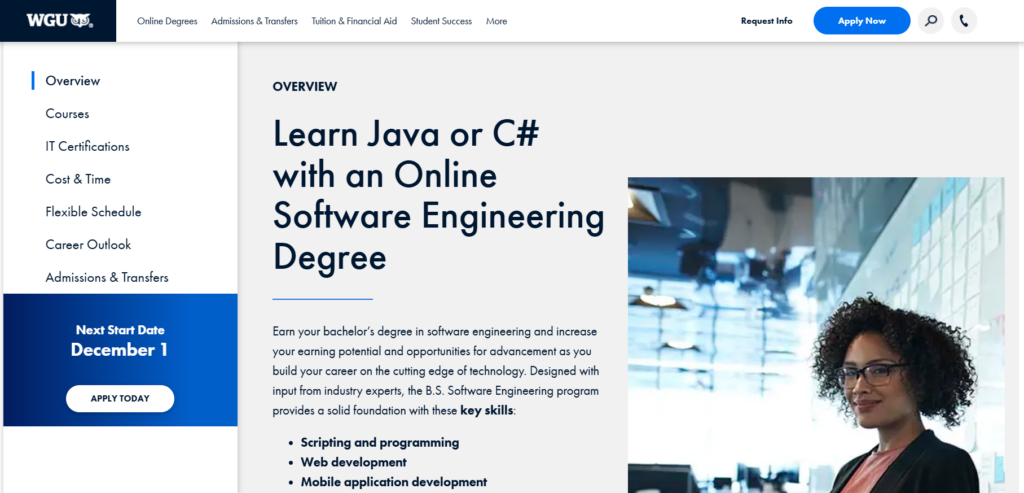
This course provides a comprehensive online software engineering degree program, focusing on core skills like programming, software development, and system lifecycle management. It includes industry-recognized certifications and offers two specialization tracks: Java or C#, allowing students to gain in-depth expertise in one of these high-demand programming languages.
- Who It’s For: Individuals seeking a flexible online degree in software engineering
- Topics Covered:
- Scripting and programming (Java or C# specialization)
- Mobile application development
- Web development fundamentals
- User experience design
- Software quality assurance and testing
- Software Development Life Cycle (SDLC)
- Online, In-Person, or Both? Online
- Exam Required? No
- Duration: 3 years to 4 years
- How Many Hours Of Instruction: Self-paced
- Eligibility Requirements:
- High School Diploma: Required for enrollment
- Program Readiness Options (choose one):
- College coursework with a minimum 2.75 GPA
- Bachelor’s or associate degree from an accredited institution
- Completion of a transferable IT certification
- High school GPA of 3.0 or higher
- Completion of previous IT coursework at the 300 level or higher
- Price: $4,085 per six-month term
- Take The Course: Western Governors University
18. Software Engineering Bootcamp (General Assembly)
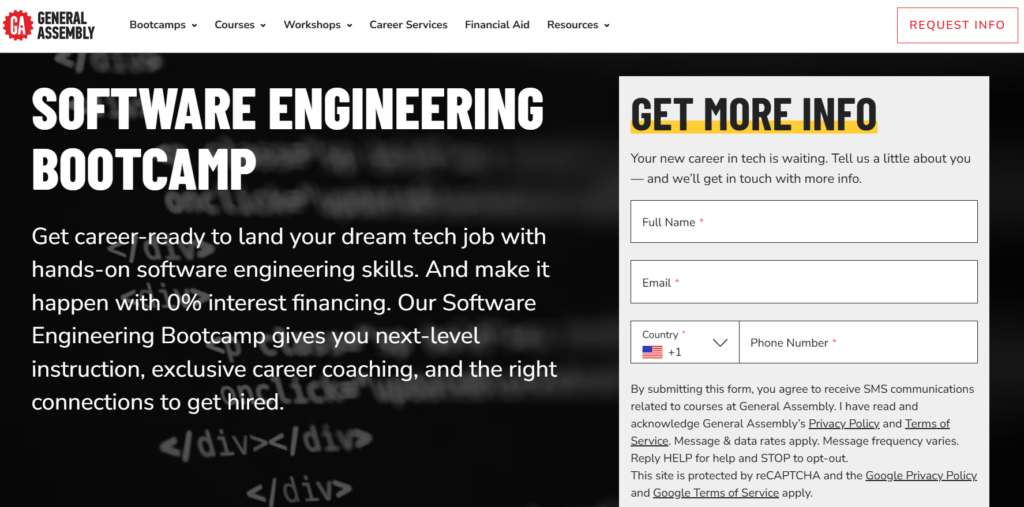
This course is an immersive bootcamp focused on building practical software engineering skills through hands-on coding in languages like Python and JavaScript. It combines technical training with career coaching to prepare students for tech development and engineering roles.
- Who It’s For: Individuals aiming to transition into software engineering or advance their technical skills
- Topics Covered:
- Full-stack development with Python and JavaScript
- Agile and Scrum project management
- Testing and debugging techniques
- Version control with Git
- Cloud computing fundamentals
- Online, In-Person, or Both? Both
- Exam Required? Yes
- Duration:
- Full-time: 12 weeks
- Part-time: 32 weeks
- How Many Hours Of Instruction:
- Full-time: 8 hours per day (Monday to Friday)
- Part-time: 15 hours per week (evening and weekends)
- Eligibility Requirements: None
- Price: $16,450 (installments and discounts also available)
- Take The Course: General Assembly
19. Algorithms and Software Engineering for Professionals (Udemy)
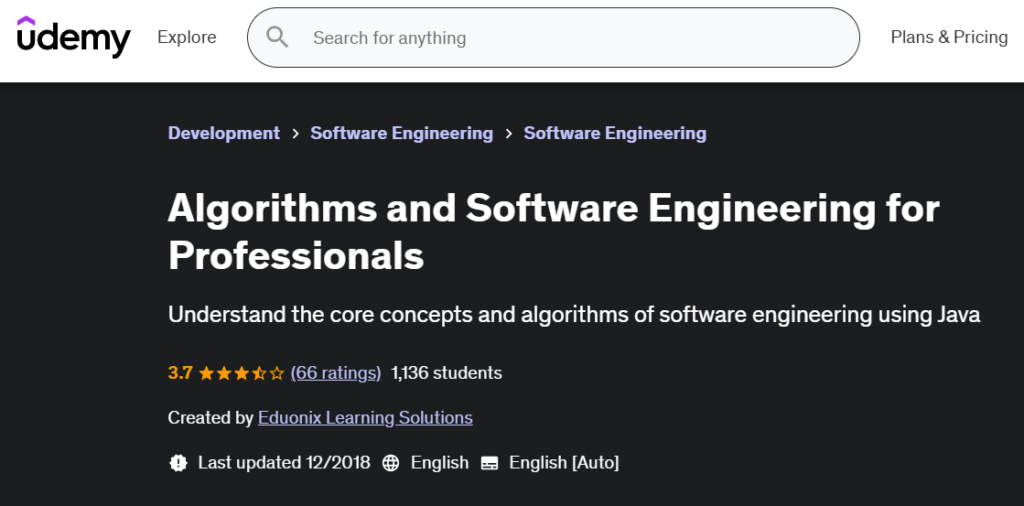
This course explores core algorithms and data structures in software engineering, using Java to teach efficient techniques for organizing, sorting, and processing data. It covers practical applications of advanced concepts like recursion, graph databases, and compiler theory to enhance software development skills.
- Who It’s For: Experienced professionals in the software industry and students wanting to master core concepts and algorithms
- Topics Covered:
- Software engineering algorithms
- Software design patterns
- Counting and optimisation
- Sorting concepts
- Stacks and queues
- Divisibility operations and primes
- Online, In-Person, or Both? Online
- Exam Required? No
- Duration: 7 hours and 30 minutes
- How Many Hours Of Instruction: Self-paced
- Eligibility Requirements: Basic programming knowledge
- Price: $19.99
- Take The Course: Udemy
20. IBM DevOps and Software Engineering Professional Certificate (IBM)
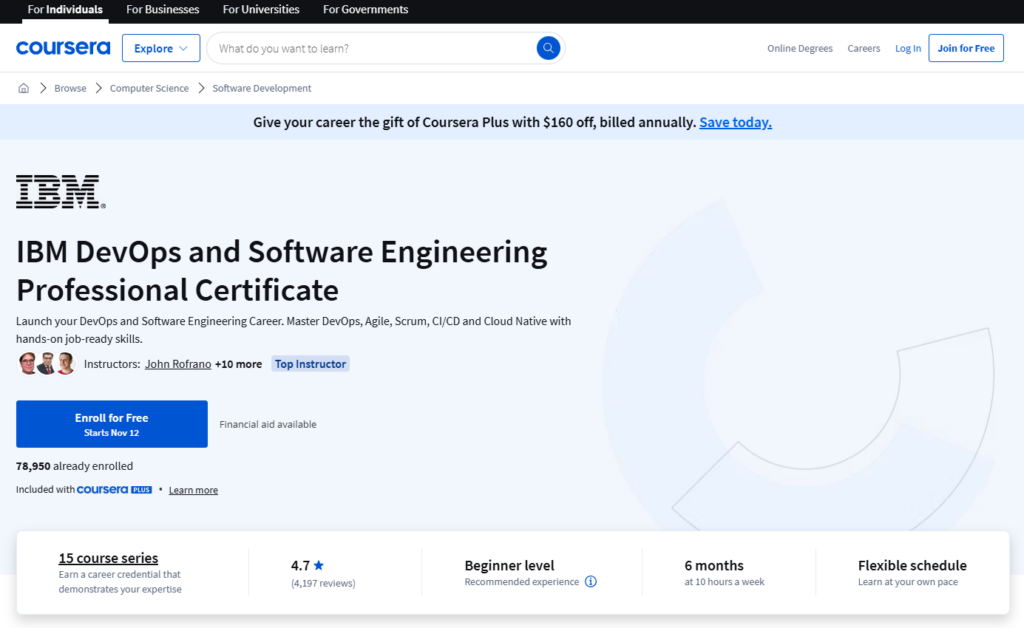
This online course equips learners with practical DevOps and software engineering skills, focusing on automation, cloud-native architectures, and continuous integration/deployment. Through hands-on labs and projects, participants gain experience with tools like Docker, Kubernetes, GitHub, and Python for developing and managing scalable applications.
- Who It’s For: Individuals interested in building a comprehensive DevOps skill set for entry-level roles in software engineering
- Topics Covered:
- Python programming and Linux shell scripting
- GitHub projects and version control
- Docker, Kubernetes, and OpenShift containerization
- Agile and Scrum methodologies
- CI/CD with Chef, Puppet, GitHub Actions, and more
- Application security and monitoring
- Online, In-Person, or Both? Online
- Exam Required? No
- Duration: 6 months
- How Many Hours Of Instruction: 10 hours per week (self-paced)
- Eligibility Requirements:
- Basic computer and IT literacy
- Background in software development or operations
- Price: Free (with optional paid certificate)
- Take The Course: Coursera
What’s Next ?
Boost your SaaS growth and leadership skills. Subscribe to our newsletter for the latest insights from CTOs and aspiring tech leaders. We'll help you scale smarter and lead stronger with guides, resources, and strategies from top experts!

